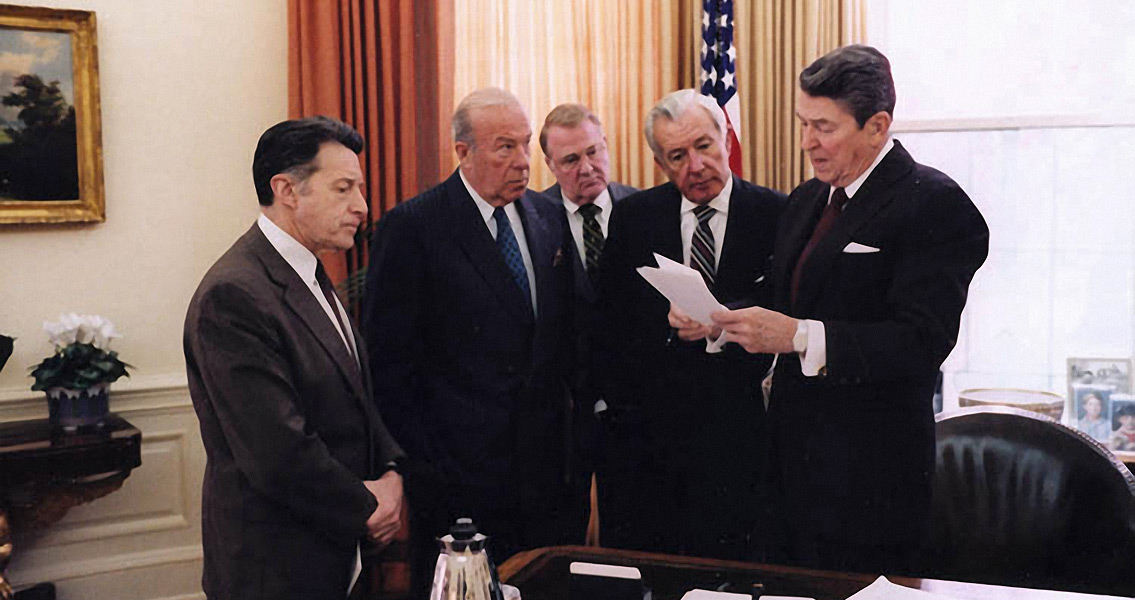<![CDATA[This week marks 25 years since the conviction of Admiral John M. Poindexter for his involvement in the Iran-Contra affair. Five years after the scandal had begun, Poindexter's trial revealed the level of deception involved, damaging the image of the American political system at home and abroad. Poindexter was convicted of five felony charges relating to conspiracy and obstructing Congress, and received a six month prison sentence. At the centre of the operation to sell weapons to Iran as a means to fund Contra forces in Nicaragua, Poindexter had been forced to resign his position in the National Security Council when the affair first became public in November 1986. The affair was a complicated mix of clandestine diplomacy and fraud. It can essentially be broken down into three main components. Firstly, the National Security Council sold Hawk missiles to Iran, a country in desperate need for weaponry as a result of a brutal war with Iraq. Secondly, in exchange for the weapons, Iran was to exert its influence to help secure the release of US hostages in Lebanon. The final component of the deal involved Nicaragua. Iran purchased the weapons at an excessively high price. The excess profits from the sale were diverted to funding the Contra rebels in Nicaragua. It seems excessively complicated, but the Reagan administration was determined to solve several foreign policy issues at once, connecting its involvement in the Middle-East with its interests in South America. The hostage crisis in Lebanon had gone on much longer than anyone could have predicted. The Hezbollah militants holding the hostages had complex motives, and showed little sign of releasing their captives. Repeated failed military attempts to free the hostages, combined with a media frenzy surrounding the crisis, had placed increasing pressure on the Reagan administration to find a solution. As for Nicaragua, the Contra rebels were fighting the Sandinista government which had come to power in the Nicaraguan Revolution of 1979. Named after César Augusto Sandino, a famed resistor to American occupation of Nicaragua in the 1920s, the Sandinista's were a left-wing government who wished to break US influence in the country. Reagan believed the Sandinista's were nothing more than a puppet for the Soviet Union in South America, and opted to back the Contra rebels in their attempt to launch a counter-revolution. On 5th October, 1986, the affair started to unravel. Eugene Hasenfus was captured by Sandinista soldiers in Nicaragua after his plane was shot down. Under interrogation, Hasenfus admitted that he had been shipping supplies to the Contra rebels. Even more dramatically, he claimed that the whole operation had been orchestrated by the CIA. Hasenfus' testimony caused uproar in the United States, triggering the investigations which ultimately unveiled the whole scandal. The Iran-Contra affair was illegal on several levels. In 1984, Reagan had agreed to the Boland amendment, which strictly prohibited the US government and CIA from aiding the Contras. Anyone in his administration involved in aiding the Contras had therefore broken the law. In addition, the US government had publicly stated a policy of refusing to aid Iran in its war with Iraq. Finally, US foreign policy had a long held rule of not negotiating with terrorists, yet the sale of weapons to Iran was a trade aimed at securing the hostages' release. President Reagan, vice-President George Bush Sr., and other members of the administration initially denied the CIA's involvement in the scandal, but a press and Congress investigation gradually revealed the details of what had happened. A series of hearings, from May to August 1987, investigated a variety of high profile figures within the Reagan administration, including Poindexter, who had served as National Security Adviser, Military aide Oliver North, CIA chief William H. Casey, and defence secretary Caspar Weinberger. In the end, it was found that Poindexter had personally authorised the transfer of funds to the Contra rebels while North had acted as the main negotiator. Casey was believed to have been involved in the scandal, but passed away before the investigations could be completed. President Reagan himself was investigated, but he denied any knowledge of what had happened. He was not charged, but to this day it is debated just how involved he was in the affair. North and Poindexter, as well as Weinberger, received heavy punishment both for their initial crimes and for deceiving Congress. However, in 1992 President George Bush Sr. officially pardoned all those who had been charged with involvement in the case, perhaps trying to close the book on the controversies of his predecessor's presidency. The Iran-Contra affair had tainted the image of the Reagan presidency, but more importantly, it led to greater cynicism over the US' involvement in foreign affairs. The Iran-Contra Scandal associated US Foreign Policy with deception and ulterior motives. For some observers, these associations have not gone away, twenty five years after Poindexter's conviction. ]]>
Poindexter Found Guilty in Iran-Contra Trial
